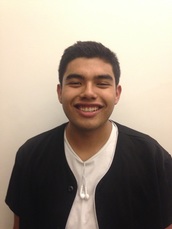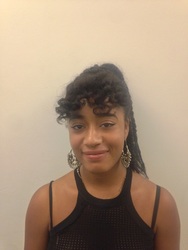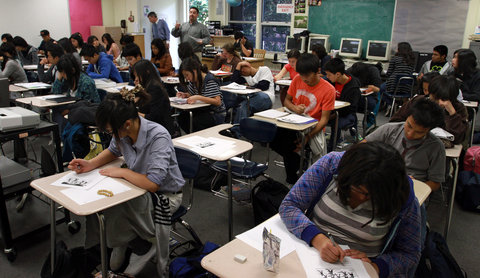"Being an interracial child it's most definitely a necessity for me to get my education since my ancestors were denied the right to have that opportunity. I wanted to know if I was the only minority that felt this way, or if others thought that OSA did a good job at dealing with ethnic/racial issues and eliminating stereotypes in the school system."
-Elena Ruiz
A lot of students felt that when August came around it was their final month until they were sent to the electrical chair that they consider school, but whenever back to school topics arose I would get giddy with excitement. Going to an art school had a lot to do with it. OSA has a lot to offer when it comes to the art emphases, 3 hours a day to do what you love is a dream come true when it comes to the terrible and stressful antics of high school. Without Literary Arts I felt like I was missing something and had no motivation to focus on my art. Lots of adults would tell me I was a strange kid for counting down the days until school started, but when I spoke to my friends they seemed to have a mixed opinion on it.
Yet when August 31st finally arrived I found myself very disappointed that my summer was over and I had to return for another year at OSA. This had nothing to do with the arts, but mostly the academics here at OSA. I understand the importance of general academics. Being an interracial child it's most definitely a necessity for me to get my education since my ancestors were denied the right to have that opportunity. A lot of the ethnic population doesn't see this as a push to try harder, but to give up simply thinking that the system is not made for them. As a young woman of color I have to work myself a lot harder than the average kid(white kid)to get accepted into top colleges. Since this year is my junior year I am not playing around when it comes to grades and my understanding of the curriculum. I wanted to know if I was the only minority that felt this way, or if others thought that OSA did a good job at dealing with ethnic/racial issues and eliminating stereotypes in the school system. I decided to interview three Caucasian students and three students of color to compare and contrast the experiences.
Yet when August 31st finally arrived I found myself very disappointed that my summer was over and I had to return for another year at OSA. This had nothing to do with the arts, but mostly the academics here at OSA. I understand the importance of general academics. Being an interracial child it's most definitely a necessity for me to get my education since my ancestors were denied the right to have that opportunity. A lot of the ethnic population doesn't see this as a push to try harder, but to give up simply thinking that the system is not made for them. As a young woman of color I have to work myself a lot harder than the average kid(white kid)to get accepted into top colleges. Since this year is my junior year I am not playing around when it comes to grades and my understanding of the curriculum. I wanted to know if I was the only minority that felt this way, or if others thought that OSA did a good job at dealing with ethnic/racial issues and eliminating stereotypes in the school system. I decided to interview three Caucasian students and three students of color to compare and contrast the experiences.

Danny Morales
Elena Ruiz: Were you excited to go back to school?
Danny Morales: I'm gonna say that, I wasn't really excited just more anxious about how I was gonna do during the school year, stuff like that. I think that was just because I was nervous about getting good grades and applying myself during the school year.
ER: When you got back to school did you feel the same way or did your feelings change?
DM: I mean, they kinda just stayed the same really, but I guess the anxiety just got a little bit less. They didn't really change in a negative or positive way.
ER: Lots of kids say they hate school because it keeps them from being free and doing other productive things they want to be doing. Do you agree with this or see the importance of school? Especially when it comes to an art school like OSA.
DM: I think it's important for kids to really want to get an education. The way that I know my dad grew up is that school always came last and so if he wanted an education he had to really work for it. I never really thought of it that way, but I always just think that I could be working right now instead of going to school, then all the school stuff can come after I've made some money.
ER:Do you feel like as a person of hispanic/latino descent that the school system has been harder for you to understand and relate to compared to kids that are Caucasian?
DM: That's just everywhere. I don't feel motivated as much as other kids or like I feel like I should be.
ER: Do you feel like that's because of your family or because of OSA?
DM: It's probably cause of OSA.
ER: So what do you think OSA could do to be better at motivating you? What makes you feel like OSA doesn't motivate you?
DM: Instead of really trying to persist in you achieving, they wanna nitpic all the little faults that happened. They wanna dwell on those things instead of leaving that in the past. They tend to use that against you.
ER: Does the curriculum make you feel this way, the teaching method?
DM: I feel like it’s a mix of both of those, and then the staff [also].
ER: So what is it about the staff that makes you feel this way?
DM: Some of them don’t know how to teach the curriculum. The others just care too much about the way they teach. You get that a lot where teachers focus on the way they teach, instead of the students.
Elena Ruiz: Were you excited to go back to school?
Danny Morales: I'm gonna say that, I wasn't really excited just more anxious about how I was gonna do during the school year, stuff like that. I think that was just because I was nervous about getting good grades and applying myself during the school year.
ER: When you got back to school did you feel the same way or did your feelings change?
DM: I mean, they kinda just stayed the same really, but I guess the anxiety just got a little bit less. They didn't really change in a negative or positive way.
ER: Lots of kids say they hate school because it keeps them from being free and doing other productive things they want to be doing. Do you agree with this or see the importance of school? Especially when it comes to an art school like OSA.
DM: I think it's important for kids to really want to get an education. The way that I know my dad grew up is that school always came last and so if he wanted an education he had to really work for it. I never really thought of it that way, but I always just think that I could be working right now instead of going to school, then all the school stuff can come after I've made some money.
ER:Do you feel like as a person of hispanic/latino descent that the school system has been harder for you to understand and relate to compared to kids that are Caucasian?
DM: That's just everywhere. I don't feel motivated as much as other kids or like I feel like I should be.
ER: Do you feel like that's because of your family or because of OSA?
DM: It's probably cause of OSA.
ER: So what do you think OSA could do to be better at motivating you? What makes you feel like OSA doesn't motivate you?
DM: Instead of really trying to persist in you achieving, they wanna nitpic all the little faults that happened. They wanna dwell on those things instead of leaving that in the past. They tend to use that against you.
ER: Does the curriculum make you feel this way, the teaching method?
DM: I feel like it’s a mix of both of those, and then the staff [also].
ER: So what is it about the staff that makes you feel this way?
DM: Some of them don’t know how to teach the curriculum. The others just care too much about the way they teach. You get that a lot where teachers focus on the way they teach, instead of the students.

Michaela Pecot
ER: Were you excited to go back to school?
Michaela Pecot: I actually was because it’s my senior year and I was really excited to see all of my friends for one of the last times ever. This is like the only year I’ve actually been excited to come back to school.
ER: When you got back to school did you feel the same way or did your feelings change?
MP: Okay, I was good for like a week and then the second week started wearing me down. This is the third week and like, it’s Wednesday and I’m basically exhausted and don’t wanna come to school tomorrow.
ER: Lots of kids say they hate school because it keeps them from being free and doing other productive things they want to be doing. Do you agree with this or see the importance of school? Especially when it comes to an art school like OSA.
MP: I definitely see the importance of school. In OSA we get a lot of freedom in terms of what we choose to do, especially during our emphasis. But I don’t know, when kids say they would be doing “productive things,” if they weren’t in school I don’t know if I necessarily agree with that. Just because I feel like these kids would not be doing anything productive. At OSA I think it’s different, we get more opportunities to further our own ventures. I know at other schools a lot of kids don’t get those opportunities and that’s why I think we should be more grateful about our school environment.
ER: Do you feel like as a person of African descent that the school system has been harder for you to understand and relate to compared to kids that are Caucasian?
MP: Yeah I would say definitely. Just because there’s a value system that’s put on certain things that’s not as relevant in black culture. I came from a family that was always really focused on education so I don’t necessarily have that entire experience, but I know that there are a lot of kids at this school and a lot of black kids in general that don’t feel connected to the school system because it’s not teaching them the things that they would care to learn about, it’s not teaching them about their history. So that kind of creates a disconnect between kids of African descent and the school system.
ER: Were you excited to go back to school?
Michaela Pecot: I actually was because it’s my senior year and I was really excited to see all of my friends for one of the last times ever. This is like the only year I’ve actually been excited to come back to school.
ER: When you got back to school did you feel the same way or did your feelings change?
MP: Okay, I was good for like a week and then the second week started wearing me down. This is the third week and like, it’s Wednesday and I’m basically exhausted and don’t wanna come to school tomorrow.
ER: Lots of kids say they hate school because it keeps them from being free and doing other productive things they want to be doing. Do you agree with this or see the importance of school? Especially when it comes to an art school like OSA.
MP: I definitely see the importance of school. In OSA we get a lot of freedom in terms of what we choose to do, especially during our emphasis. But I don’t know, when kids say they would be doing “productive things,” if they weren’t in school I don’t know if I necessarily agree with that. Just because I feel like these kids would not be doing anything productive. At OSA I think it’s different, we get more opportunities to further our own ventures. I know at other schools a lot of kids don’t get those opportunities and that’s why I think we should be more grateful about our school environment.
ER: Do you feel like as a person of African descent that the school system has been harder for you to understand and relate to compared to kids that are Caucasian?
MP: Yeah I would say definitely. Just because there’s a value system that’s put on certain things that’s not as relevant in black culture. I came from a family that was always really focused on education so I don’t necessarily have that entire experience, but I know that there are a lot of kids at this school and a lot of black kids in general that don’t feel connected to the school system because it’s not teaching them the things that they would care to learn about, it’s not teaching them about their history. So that kind of creates a disconnect between kids of African descent and the school system.

Mikhi Woodley
ER: Were you excited to go back to school?
Mikhi Woodley: No. Mainly because it’s (kind of, not necessarily) a waste of my time, but I feel like I’m learning things that aren’t relevant to things that I’m gonna need to be productive in society, mainly math and science. Unless you’re going to a specific field, you’re not gonna need everything that they’re teaching you. If you wanted to become a scientist then you go ahead and take these classes to become that, or if you wanted to become something else in another profession you can take classes that are directed more towards that. Other than that it’s low-key a waste of my time
ER: When you got back to school did you feel the same way or did your feelings change?
MW: I felt exactly the same way.
ER: Lots of kids say they hate school because it keeps them from being free and doing other productive things they want to be doing. Do you agree with this or see the importance of school? Especially when it comes to an art school like OSA.
MW: I can agree with that but I also have to disagree because there are crucial skills that you do learn and you pick up as far as like communicating and being able to work with other people productively. Especially at OSA because I don’t think in any of the arts you don’t communicate and rely on other people. It’s definitely important though.
ER: So what do you feel like you’re not getting educated on? Is there anything specific that you feel like you need to be educated on to move up in life?
MW: Definitely, I definitely feel like they’re educating you...not necessarily to become a robot but more so to just go along with everything that goes on as opposed to knowing "this is the game, this is how society uses you, this is how society is going to treat this." And you have to play the game just to get ahead, but you don’t 100% need to believe the game.
ER: Mr.Rosenberg? ( English teacher here at OSA)
MW: Yeah yeah, exactly! I actually, I’ll take it back because English is the subject I feel like it’s cool, it’s necessary to be literate, but I feel like specifically with Mr. Rosenberg that’s exactly what he told us like you don’t need to like everything, you don’t need to take everything to heart--but you need to do what’s necessary to pass the class to get the grade; keep those doors open.
ER: Do you feel like as a person of African descent that the school system has been harder for you to understand and relate to compared to kids that are Caucasian?
MW: I think at OSA there’s a pretty equal spectrum, but I know at other schools like when I went to O-high [Oakland High School] there was definitely different treatment. I remember on the first week they gave me way more leeway, they’d go ahead and be like “Yeah you have a little extra time to finish this assignment.” Like dude I have the assignment for you right now, it’s in my backpack I can pull it out there’s no need for extra time. I feel like if they had a discussion with the kid and their parents and the kid somewhat needed it then so be it, but I feel like that should be with certain guidelines too. That kinda gives all the kids that they do that to bad work ethic for the future.
ER: It also gives them the impression that they don’t expect much from them anyway.
ER: Were you excited to go back to school?
Mikhi Woodley: No. Mainly because it’s (kind of, not necessarily) a waste of my time, but I feel like I’m learning things that aren’t relevant to things that I’m gonna need to be productive in society, mainly math and science. Unless you’re going to a specific field, you’re not gonna need everything that they’re teaching you. If you wanted to become a scientist then you go ahead and take these classes to become that, or if you wanted to become something else in another profession you can take classes that are directed more towards that. Other than that it’s low-key a waste of my time
ER: When you got back to school did you feel the same way or did your feelings change?
MW: I felt exactly the same way.
ER: Lots of kids say they hate school because it keeps them from being free and doing other productive things they want to be doing. Do you agree with this or see the importance of school? Especially when it comes to an art school like OSA.
MW: I can agree with that but I also have to disagree because there are crucial skills that you do learn and you pick up as far as like communicating and being able to work with other people productively. Especially at OSA because I don’t think in any of the arts you don’t communicate and rely on other people. It’s definitely important though.
ER: So what do you feel like you’re not getting educated on? Is there anything specific that you feel like you need to be educated on to move up in life?
MW: Definitely, I definitely feel like they’re educating you...not necessarily to become a robot but more so to just go along with everything that goes on as opposed to knowing "this is the game, this is how society uses you, this is how society is going to treat this." And you have to play the game just to get ahead, but you don’t 100% need to believe the game.
ER: Mr.Rosenberg? ( English teacher here at OSA)
MW: Yeah yeah, exactly! I actually, I’ll take it back because English is the subject I feel like it’s cool, it’s necessary to be literate, but I feel like specifically with Mr. Rosenberg that’s exactly what he told us like you don’t need to like everything, you don’t need to take everything to heart--but you need to do what’s necessary to pass the class to get the grade; keep those doors open.
ER: Do you feel like as a person of African descent that the school system has been harder for you to understand and relate to compared to kids that are Caucasian?
MW: I think at OSA there’s a pretty equal spectrum, but I know at other schools like when I went to O-high [Oakland High School] there was definitely different treatment. I remember on the first week they gave me way more leeway, they’d go ahead and be like “Yeah you have a little extra time to finish this assignment.” Like dude I have the assignment for you right now, it’s in my backpack I can pull it out there’s no need for extra time. I feel like if they had a discussion with the kid and their parents and the kid somewhat needed it then so be it, but I feel like that should be with certain guidelines too. That kinda gives all the kids that they do that to bad work ethic for the future.
ER: It also gives them the impression that they don’t expect much from them anyway.

Chloe Xtina
ER: Were you excited to go back to school?
Chloe Xtina: I actually was, I was past summer. I had a good summer but I didn’t have as great as a summer as I thought I was gonna have. I’m excited for this year just cause outside of school too there’s a lot of stuff going on for me.
ER:When you got back to school did you feel the same way or did your feelings change?
CX: My feelings did change about school. I feel like my teachers are more motivated. I am taking a few courses that I have to take, but I’ve been doing AP and Honors and Electives, so all my teachers know I want to be there and the people around me want to be there too so it’s a good environment.
ER: Lots of kids say they hate school because it keeps them from being free and doing other productive things they want to be doing. Do you agree with this or see the importance of school? Especially when it comes to an art school like OSA.
CX: Especially at OSA people don’t understand the privilege they have going to school, school is such a privilege. Sometimes teachers or administration or the other students don’t take the action they need to to make it an interesting environment and just see it as a basic regular day thing that you have to do. At OSA there are a lot of kids who say they hate school just for the sake of saying they hate school, like you’re suppose to hate school. In reality you’re going to an arts school that’s really gonna benefit you in the long run for whatever you wanna do with your art, whether you wanna pursue it or not. Even if you don’t like being at OSA because of whatever reason, instead of complaining about it take the resources you have and use them. If you really need to get out of the school, then get out of the school. Make room for other people.
ER: Do you feel like as a person that is Caucasian the school system has been easier for you to understand and relate to?
CX: Oh yeah, definitely, yeah. I noticed that my teachers, some of them can be a lil’ biased for example Ms.Nimka last year. She told us a story where she was like “I was worried because my black students didn’t learn as much that I was racist.” Just overall the school system be it OSA or whatever, I think OSA does it a little bit more, but there’s definitely this idea that white kids are more put together and the assumption that kids of color don’t care as much as white kids do. So then the teachers stop caring even though they have no basis for that.
ER: Were you excited to go back to school?
Chloe Xtina: I actually was, I was past summer. I had a good summer but I didn’t have as great as a summer as I thought I was gonna have. I’m excited for this year just cause outside of school too there’s a lot of stuff going on for me.
ER:When you got back to school did you feel the same way or did your feelings change?
CX: My feelings did change about school. I feel like my teachers are more motivated. I am taking a few courses that I have to take, but I’ve been doing AP and Honors and Electives, so all my teachers know I want to be there and the people around me want to be there too so it’s a good environment.
ER: Lots of kids say they hate school because it keeps them from being free and doing other productive things they want to be doing. Do you agree with this or see the importance of school? Especially when it comes to an art school like OSA.
CX: Especially at OSA people don’t understand the privilege they have going to school, school is such a privilege. Sometimes teachers or administration or the other students don’t take the action they need to to make it an interesting environment and just see it as a basic regular day thing that you have to do. At OSA there are a lot of kids who say they hate school just for the sake of saying they hate school, like you’re suppose to hate school. In reality you’re going to an arts school that’s really gonna benefit you in the long run for whatever you wanna do with your art, whether you wanna pursue it or not. Even if you don’t like being at OSA because of whatever reason, instead of complaining about it take the resources you have and use them. If you really need to get out of the school, then get out of the school. Make room for other people.
ER: Do you feel like as a person that is Caucasian the school system has been easier for you to understand and relate to?
CX: Oh yeah, definitely, yeah. I noticed that my teachers, some of them can be a lil’ biased for example Ms.Nimka last year. She told us a story where she was like “I was worried because my black students didn’t learn as much that I was racist.” Just overall the school system be it OSA or whatever, I think OSA does it a little bit more, but there’s definitely this idea that white kids are more put together and the assumption that kids of color don’t care as much as white kids do. So then the teachers stop caring even though they have no basis for that.

Emma Talamantes
ER: Were you excited to go back to school?
Emma Talamantes: I was kind of excited. I looked forward to taking classes that actually interested me, particularly the AP classes that I’m taking.
ER: When you got back to school did you feel the same way or did your feelings change?
ET: They stayed the same way. I was excited I was just also a little overwhelmed because Junior year I feel like a lot of stuff happens in your life outside of school that are just as important. It’s really hard to find a way to try and balance everything so you don’t go crazy or so that you’re not being really unhealthy.
ER: Lots of kids say they hate school because it keeps them from being free and doing other productive things they want to be doing. Do you agree with this or see the importance of school? Especially when it comes to an art school like OSA.
ET:I really value my education, just because particularly in my mother’s lineage in her family a lot of the people are uneducated. My mom didn’t even graduate high school. That pushes me to go to school so that I can eventually do what I wanna do because I see what happens when you don’t get an education. Also to speak on the OSA thing, I’m doing what I love to do at OSA, so if I went to a normal school then I would be saying that same kind of thing because I would be like I wanna be writing right now, but that’s what I do at the school.
ER: Do you feel like as a person that is Caucasian the school system has been easier for you to understand and relate to?
ET: Definitely and I also see on a daily basis even with my friends the way that it alienates people of color and the way that it treats people’s attitudes in school. Especially in Oakland where a lot of people come from situations where you can’t really know what their home/living situation is and people kind of lack patience a lot of the time with people of color especially poor people of color. As you get higher up in the school system, they try to push people of color out the more seemingly high caliber classes like AP classes because they disregard them as disruptive and they just don’t have patience for them. I’ve witnessed that, my sister who goes to Tech [Oakland Technical High School] she was talking about how in her Spanish class she wished that all these kids would get kicked out because they were so loud and disruptive and I was trying to explain to her that that wasn’t fair to them because it’s their school too, and they have the right to an education just as much as she does, even if they don’t necessarily see that right now.
ER: Were you excited to go back to school?
Emma Talamantes: I was kind of excited. I looked forward to taking classes that actually interested me, particularly the AP classes that I’m taking.
ER: When you got back to school did you feel the same way or did your feelings change?
ET: They stayed the same way. I was excited I was just also a little overwhelmed because Junior year I feel like a lot of stuff happens in your life outside of school that are just as important. It’s really hard to find a way to try and balance everything so you don’t go crazy or so that you’re not being really unhealthy.
ER: Lots of kids say they hate school because it keeps them from being free and doing other productive things they want to be doing. Do you agree with this or see the importance of school? Especially when it comes to an art school like OSA.
ET:I really value my education, just because particularly in my mother’s lineage in her family a lot of the people are uneducated. My mom didn’t even graduate high school. That pushes me to go to school so that I can eventually do what I wanna do because I see what happens when you don’t get an education. Also to speak on the OSA thing, I’m doing what I love to do at OSA, so if I went to a normal school then I would be saying that same kind of thing because I would be like I wanna be writing right now, but that’s what I do at the school.
ER: Do you feel like as a person that is Caucasian the school system has been easier for you to understand and relate to?
ET: Definitely and I also see on a daily basis even with my friends the way that it alienates people of color and the way that it treats people’s attitudes in school. Especially in Oakland where a lot of people come from situations where you can’t really know what their home/living situation is and people kind of lack patience a lot of the time with people of color especially poor people of color. As you get higher up in the school system, they try to push people of color out the more seemingly high caliber classes like AP classes because they disregard them as disruptive and they just don’t have patience for them. I’ve witnessed that, my sister who goes to Tech [Oakland Technical High School] she was talking about how in her Spanish class she wished that all these kids would get kicked out because they were so loud and disruptive and I was trying to explain to her that that wasn’t fair to them because it’s their school too, and they have the right to an education just as much as she does, even if they don’t necessarily see that right now.

Ben Schecter
ER: Were you excited to go back to school?
Ben Schecter: I was not excited, but not because I wasn’t excited to be here it was because I was worried about all the classes I’d be taking this year, but it’s now the third week and I am getting into the groove of things.
ER:When you got back to school did you feel the same way or did your feelings change?
BS: It was just daunting to have all this work sit in front of me. I think I’m handling it quite well.
ER: Lots of kids say they hate school because it keeps them from being free and doing other productive things they want to be doing. Do you agree with this or see the importance of school? Especially when it comes to an art school like OSA.
BS: Y’all are liars to anybody who ever said that...because all you guys do is sit at home and play video games. Maybe you make music, maybe you are in a couple of plays, and maybe you’ve been in a commercial before, but I promise you if somebody says I could be using my time so much better then they’re the people who aren’t using their time correctly. I’m taking a bunch of AP classes, I’m in rehearsal, I’m also making music, and the more things you’re doing the better you are at the things that you care about. If you didn’t go to school then how on earth would you know that you cared about something since you had to make time for it?
ER: Do you feel like as a person that is Caucasian the school system has been easier for you to understand and relate to?
BS: Because I’m white I couldn’t tell you because I’ve never been black. So I couldn’t tell you what it was like or what it would be like for a black person. I imagine that a lot of the English and history classes can be very frustrating especially when they’re mostly old, white authors and as a white person I’ve been able to see that sometimes it’s very focused on old white dead men. As somebody who’s really into hip-hop I feel like school could be so much more interesting if it was modernized ...I would imagine the average kid is not going to enjoy reading Chekhov ( I like Anton Chekhov) but rather they would read something more modern or something from a black woman rather than just an old white man. History as well can be probably very ostracizing sometimes when it’s talking about slavery, it can be a touchy subject. It’s a touchy subject regardless but I feel like if a black teacher taught it and more time was spent on the actual physiological effects of having generations of people told that they weren’t human beings, that would be interesting to me personally.
...
All in all the responses I received from everyone were very eye opening and relatable. What really stood out to me was that every caucasian person I spoke to noticed the imbalance between the way students are approached based on their ethnicity and it really says a lot about the school system and what needs to be changed to accommodate everyone’s general education of their culture. As students it is primarily up to us to let our teachers know what we need to succeed, be that as a race of people or personally. The school system will never change if we don’t stand up and do something about it. In a lot of ways school sets you up for the real world and I think I speak for a lot of people when I say that I don’t want to see generations behind me fail to succeed at life because their academic needs aren’t met. It’s just not right. So what’s up, unified school districts?
ER: Were you excited to go back to school?
Ben Schecter: I was not excited, but not because I wasn’t excited to be here it was because I was worried about all the classes I’d be taking this year, but it’s now the third week and I am getting into the groove of things.
ER:When you got back to school did you feel the same way or did your feelings change?
BS: It was just daunting to have all this work sit in front of me. I think I’m handling it quite well.
ER: Lots of kids say they hate school because it keeps them from being free and doing other productive things they want to be doing. Do you agree with this or see the importance of school? Especially when it comes to an art school like OSA.
BS: Y’all are liars to anybody who ever said that...because all you guys do is sit at home and play video games. Maybe you make music, maybe you are in a couple of plays, and maybe you’ve been in a commercial before, but I promise you if somebody says I could be using my time so much better then they’re the people who aren’t using their time correctly. I’m taking a bunch of AP classes, I’m in rehearsal, I’m also making music, and the more things you’re doing the better you are at the things that you care about. If you didn’t go to school then how on earth would you know that you cared about something since you had to make time for it?
ER: Do you feel like as a person that is Caucasian the school system has been easier for you to understand and relate to?
BS: Because I’m white I couldn’t tell you because I’ve never been black. So I couldn’t tell you what it was like or what it would be like for a black person. I imagine that a lot of the English and history classes can be very frustrating especially when they’re mostly old, white authors and as a white person I’ve been able to see that sometimes it’s very focused on old white dead men. As somebody who’s really into hip-hop I feel like school could be so much more interesting if it was modernized ...I would imagine the average kid is not going to enjoy reading Chekhov ( I like Anton Chekhov) but rather they would read something more modern or something from a black woman rather than just an old white man. History as well can be probably very ostracizing sometimes when it’s talking about slavery, it can be a touchy subject. It’s a touchy subject regardless but I feel like if a black teacher taught it and more time was spent on the actual physiological effects of having generations of people told that they weren’t human beings, that would be interesting to me personally.
...
All in all the responses I received from everyone were very eye opening and relatable. What really stood out to me was that every caucasian person I spoke to noticed the imbalance between the way students are approached based on their ethnicity and it really says a lot about the school system and what needs to be changed to accommodate everyone’s general education of their culture. As students it is primarily up to us to let our teachers know what we need to succeed, be that as a race of people or personally. The school system will never change if we don’t stand up and do something about it. In a lot of ways school sets you up for the real world and I think I speak for a lot of people when I say that I don’t want to see generations behind me fail to succeed at life because their academic needs aren’t met. It’s just not right. So what’s up, unified school districts?


